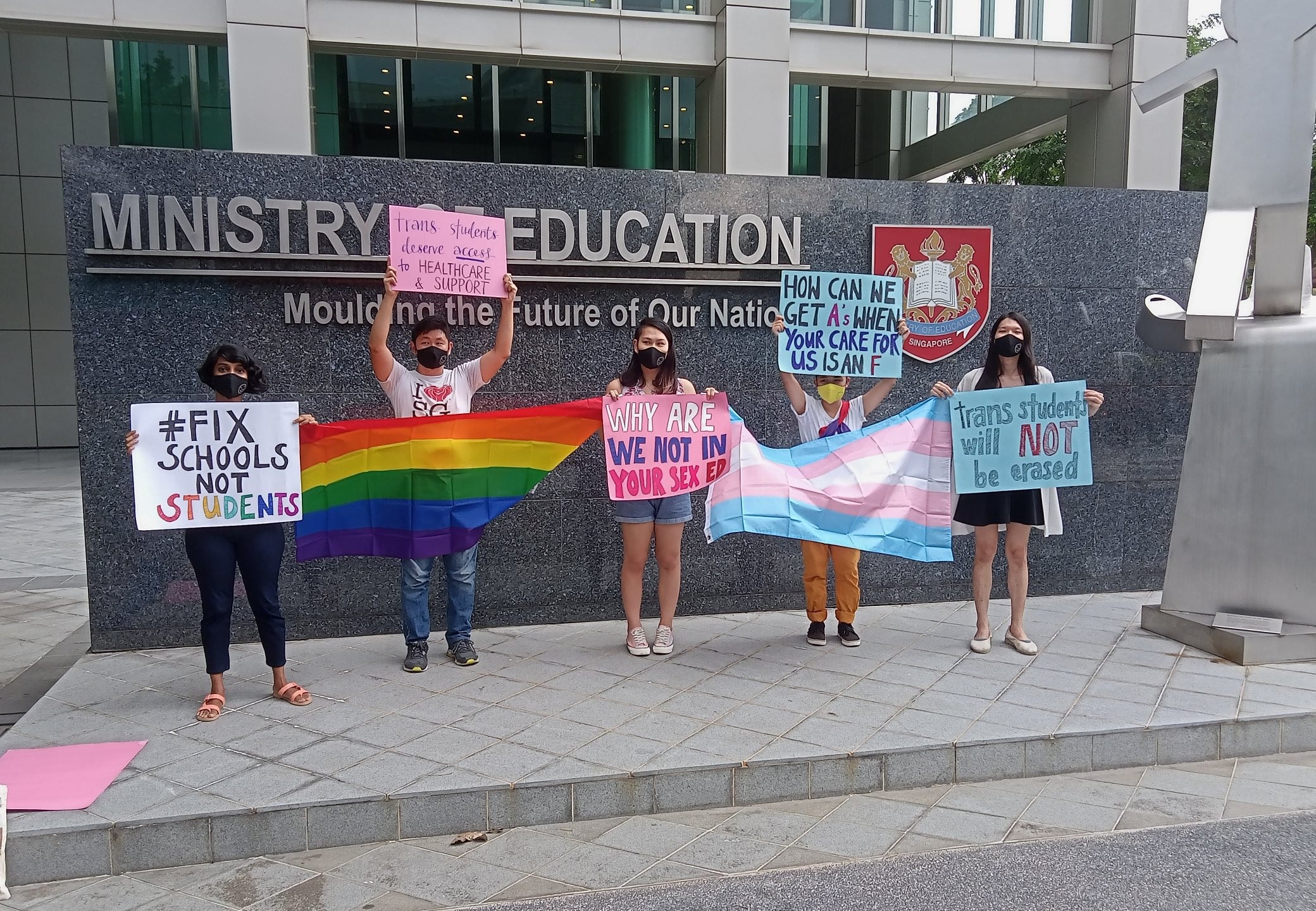It was all over so quickly that I’ve found myself wondering if it could only have been described as a “protest” within Singapore’s restrictive context.
Five people, aged between 19 and 40, gathered in front of the headquarters of Singapore’s Ministry of Education in the afternoon of Jan. 26. They held up placards protesting transphobia and homophobia in the formal education system, lining up with the rainbow flag and trans flag held between them.
As a journalist who has reported on and written about LGBTQ+ rights and the movement for equality in Singapore, I’d received a heads-up and a press statement about the protest beforehand, so I was there from the beginning to snap photos and live-tweet the event. I would never have caught it otherwise; mere minutes after protesters held up their placards, security officers approached them to say that they weren’t allowed to be there. (One told me that I couldn’t take photos, but left me alone after I pointed out that I was a journalist standing on a public street.) Two of the protesters decided that they would leave. The other three remained with their placards: “#FIX SCHOOLS NOT STUDENTS,” “HOW CAN WE GET A’s WHEN YOUR CARE FOR US IS AN F,” “trans students will NOT be erased.”
A group of plainclothes police officers arrived quickly, wanting the remaining three protesters to clear off. But they decided to stand their ground. I couldn’t catch the whole conversation, but overheard an officer telling them that there were “other avenues” they could use to raise their concerns, and that they’d already had 20 minutes of “exposure” for their cause. To that last comment, a protester pointed out that police officers had crowded around them, blocking their placards from public view, for most of that time.
Each protester was issued a “move-on” direction; still, they chose to stay. They were ultimately placed under arrest and whisked away in a police van, bailed out later that night by friends after spending some time locked-up. The two other protesters who’d left—thus avoiding arrest—were told to present themselves at a police station for questioning. In addition to interrogating the protesters, the police also confiscated their placards, flags and mobile phones. On Jan. 30, I received a call from the police telling me to present myself at the police station for questioning in the coming week.
LGBTQ+ issues within Singapore’s education system recently made their way into public consciousness after an 18-year-old trans student posted on Reddit’s r/SGExams subreddit, claiming that both her school and the Ministry of Education had meddled with her planned hormonal treatment. According to Ashlee (whose name has been changed to protect her identity), her school insisted that she conform to regulated gender norms, even though she was officially diagnosed with gender dysphoria and had the permission and support of her parents to begin hormone replacement therapy (HRT). Ashlee says the school wanted her to cut her hair and put on the boys’ uniform to abide by school rules that govern the appearance of male students. School officials allegedly also warned her and her parents that if HRT prevented Ashlee from fitting into the boys’ uniform, she would be expelled.
“Each protester was issued a ‘move-on’ direction; still, they chose to stay.”
Although the Ministry of Education has denied interfering with Ashlee’s treatment (via a statement in which they misgendered her), LGBTQ+ rights groups and activists say her experience isn’t unique and far from the only problem queer and trans youth face in Singapore’s education system.
In their press statement, the protesters pointed to other examples of prejudice and discrimination young queer and trans Singaporeans have faced in school: A lack of counselling services that affirm LGBTQ+ identities (with some even recommending students and parents try conversion therapy); school administrators and educators outing queer students without their consent; and the policing and shaming of students’ intimate relationships. There’s also a lack of open and inclusive discussions about LGBTQ+ issues in schools, with former teachers saying that they were told to steer clear of such topics.
This reluctance to openly acknowledge and talk about LGBTQ+ issues in schools can be directly connected to the establishment’s overarching attitudes toward queer and trans people in Singapore. Although the government is keen to present the country as a place where LGBTQ+ foreigners are welcome and where discrimination isn’t a problem, it’s also reluctant to anger religious conservatives—particularly conservative Evangelical Christians who often parrot American right-wing homophobic rhetoric. The government, formed by a ruling party that has been in power since 1959, has repeatedly refused to repeal colonial-era legislation—particularly Section 377A of the Singapore Penal Code that criminalizes sex between men. Instead, they’ve merely promised not to proactively enforce the law. (Constitutional challenges against Section 377A are currently before the Court of Appeal.)
Activists point out that, enforcement or not, the existence of Section 377A itself is enough to affect LGBTQ+ lives in multiple ways. The law’s presence signals a lack of acceptance of queer and trans identities and relationships. It also bars the legal recognition of same-sex marriage, making it difficult for LGBTQ+ Singaporeans to access subsidized public housing. In 2017, a couple were refused a public housing flat after the partner (who is trans) completed her gender affirmation surgery and officially changed her legal sex on her identity card because they’d gone from a “straight” couple to a same-sex one. The authorities refused to hand over the flat the couple had already paid the deposit for, and eventually made the decision to strike their marriage off the Registry of Marriages.
“While the protesters were moved to act because of Ashlee’s story, their protest was about much more than a single case.”
Positive or even neutral portrayals of queer relationships are also censored from the mainstream media. While young Singaporeans can (and do) turn to sources like YouTube and Netflix to see LGBTQ+ relationships represented in media, such active local censorship stifles public discourse and understanding by reducing the number of platforms in which LGBTQ+ and gender justice can be discussed within the Singaporean context.
While the protesters were moved to act because of Ashlee’s story, their statement made it clear that their protest was about much more than a single case. “I have seen and heard of far too many generations of transgender students who have been subjected to the disciplinary violence of [Ministry of Education]-run schools—me included—with regards to the regulating of hairstyles, wearing of gendered uniforms, the lack of access to medical treatment and the prevention of trans alumni returning, among other forms of discrimination,” student activist Lune Loh said in her message to the press.
To observers from outside Singapore, a five-person protest with placards might be seen as minor and insignificant. But such demonstrations are rare in the Southeast Asian city-state, which has expansive laws criminalizing protests—even single-person ones—unless police permission is first obtained. There is only one park in the entire country in which Singaporeans can protest without a permit, but it’s currently closed to such activities due to the pandemic.
Police investigations are ongoing, and it remains to be seen what action will be taken against these protesters. But they’re clear about what they’re fighting for. As they said in their statement: “We envision a society that cares deeply for the well-being of all children in Singapore, where no child has to struggle to survive and has every opportunity to thrive in the life they have chosen for themselves.”


 Why you can trust Xtra
Why you can trust Xtra


